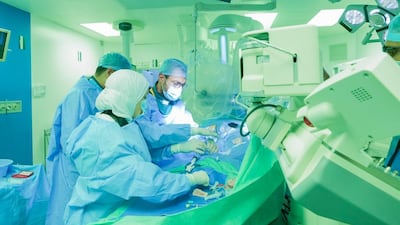The UAE has become the third country in the world to use a type of leadless pacemaker after it was implanted in patients in the US and Canada.
Al Qassimi hospital in Sharjah successfully placed the dual-chamber Aveir device in a 71-year-old patient on Monday.
Dr Mohamed Mjady, head of the arrhythmia unit at the hospital, said the pacemaker, from US company Abbott, is implanted in the heart’s right ventricle using a minimally invasive procedure to treat slower-than-normal heart rates.
He said his patient, from Iraq, came to the hospital in November to seek treatment for pneumonia.
“He was admitted to the ICU and during his treatment for pneumonia, it was discovered that his heartbeat was abnormally slow,” Dr Mjady said.
“It was as low as 20, while a normal heartbeat should be between 60 and 80. Doctors had to put him on medications to increase his heartbeat.”
The patient also suffered from low blood pressure.
“He needed a pacemaker, but we had to wait until he recovered from pneumonia,” Dr Mjady said. “Otherwise, we could risk the infection getting to the device and from it to the heart muscle.
“The pacemaker will spare patients like him from undergoing traditional surgery as it only requires a cannula-size piercing.”
Minimally invasive and leadless
According to Cleveland Clinic, traditional pacemakers require an incision to implant a power generator placed under the skin near the collarbone, which then connects to wires that are stretched through veins and attached to the heart muscle.
The hospital said on its website that studies have shown that up to one in six patients will experience a complication with this type of pacemaker over a three-year period, most commonly bleeding or infection in the surgical pocket or dislodgement, fracture or blood clots around the wires.
Leadless pacemakers are miniaturised devices implanted using a catheter in the thigh vein and then implanted directly into the heart.

Unlike traditional pacemakers, leadless pacemakers do not require an incision in the chest to implant the device or cardiac leads to deliver therapy.
The device has a unique mapping capability designed to allow physicians to measure electrical signals within the heart and determine the correct placement of the device before final implantation, Abbot said.
Pricer but lasts longer
In the UAE, the Aveir VR pacemaker costs around Dh70,000, said Dr Mjady. It is the smallest one of its kind in the world and is supported by a battery that lasts up to 25 years.
“Similar pacemakers that were available before cost Dh25,000 and the battery lasts between five to eight years,” he said.
He said Abbot had chosen the hospital to become a training centre for doctors from across the world, including Europe.
“Doctors from Italy and France have already approached Al Qassimi hospital and have booked training appointments in January,” he added.
“After completing their training, they will get certificates accredited by the Emirates Health Services and Abbot to perform the procedures at their own health facilities.”
The Food and Drug Administration approved the device in April, with Health Canada giving it clearance in November.


